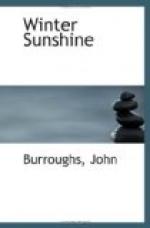The crow may not have the sweet voice which the fox in his flattery attributed to him, but he has a good, strong, native speech, nevertheless. How much character there is in it! How much thrift and independence! Of course his plumage is firm, his color decided, his wit quick. He understands you at once and tells you so; so does the hawk by his scornful, defiant whir-r-r-r-r. Hardy, happy outlaws, the crows, how I love them! Alert, social, republican, always able to look out for himself, not afraid of the cold and the snow, fishing when flesh is scarce, and stealing when other resources fail, the crow is a character I would not willingly miss from the landscape. I love to see his track in the snow or the mud, and his graceful pedestrianism about the brown fields.
He is no interloper, but has the air and manner of being thoroughly at home, and in rightful possession of the land. He is no sentimentalist like some of the plaining, disconsolate song-birds, but apparently is always in good health and good spirits. No matter who is sick, or dejected, or unsatisfied, or what the weather is, or what the price of corn, the crow is well and finds life sweet. He is the dusky embodiment of worldly wisdom and prudence. Then he is one of Nature’s self-appointed constables and greatly magnifies his office. He would fain arrest every hawk or owl or grimalkin that ventures abroad. I have known a posse of them to beset the fox and cry “Thief!” till Reynard hid himself for shame. Do I say the fox flattered the crow when he told him he had a sweet voice? Yet one of the most musical sounds in nature proceeds from the crow. All the crow tribe, from the blue jay up, are capable of certain low ventriloquial notes that have peculiar cadence and charm. I often hear the crow indulging in his in winter, and am reminded of the sound of the dulcimer. The bird stretches up and exerts himself like a cock in the act of crowing, and gives forth a peculiarly clear, vitreous sound that is sure to arrest and reward your attention. This is no doubt the song the fox begged to be favored with, as in delivering it the crow must inevitably let drop the piece of meat.
The crow in his purity, I believe, is seen and heard only in the North. Before you reach the Potomac there is an infusion of a weaker element, the fish crow, whose helpless feminine call contrasts strongly with the hearty masculine caw of the original Simon.
In passing from crows to colored men, I hope I am not guilty of any disrespect toward the latter. In my walks about Washington, both winter and summer, colored men are about the only pedestrians I meet; and I meet them everywhere, in the fields and in the woods and in the public road, swinging along with that peculiar, rambling, elastic gait, taking advantage of the short cuts and threading the country with paths and byways. I doubt if the colored man can compete with his white brother as a walker; his foot is too flat and the calves of his legs too small, but he is certainly the most picturesque traveler to be seen on the road. He bends his knees more than the white man, and oscillates more to and fro, or from side to side. The imaginary line which his head describes is full of deep and long undulations. Even the boys and young men sway as if bearing a burden.




